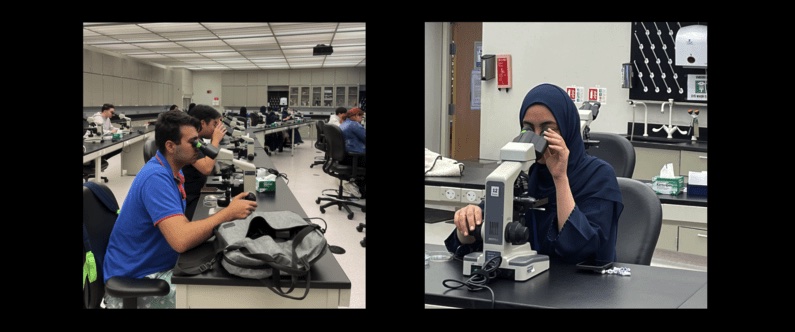WCM-Q joins QF multiversity events
 GU-Q students learnt about the basic sciences during their time in the teaching labs at WCM-Q as part of the Science for All program.
GU-Q students learnt about the basic sciences during their time in the teaching labs at WCM-Q as part of the Science for All program.
Students and faculty at Weill Cornell Medicine-Qatar (WCM-Q) connected with peers from other Qatar Foundation (QF) universities at Education City (EC) in support of QF’s innovative ‘multiversity’ system by taking part in several joint events.
In one such event, WCM-Q co-sponsored the 8th Biennial Conference of the Middle East-North Africa Writing Center Alliance (MENAWCA), which brought together teachers, tutors, peer tutors, center directors, and other professionals who support student writers in the MENA region to share and discuss the innovative practices they have explored.
WCM-Q’s contribution to the MENAWCA event was led by Dr. Adam Larson, assistant professor of English as a second language, who worked alongside fellow academics from QF partner universities Virginia Commonwealth University School of the Arts in Qatar, Carnegie Mellon University in Qatar, Northwestern University in Qatar, Georgetown University in Qatar (GU-Q), and Texas A&M University at Qatar. Held at Multaqa in EC, the theme of the three-day conference was ‘Writing Centers: Multidisciplinary & Multimodal Spaces for Engagement’ and featured sessions on developing effective strategies for multilingual learners, the future of remote learning in writing centers, the art of questioning in writing conferences, and tutoring in the digital space, among many other subjects.
Dr. Larson said: “WCM-Q shares MENAWCA’s commitment to supporting writing and communication across the curriculum. Our students live in a multimodal world where they learn and communicate through text, image, and video in multiple languages. Writing centers can help students navigate these complex multimodal tasks, helping them to become more effective communicators. The MENAWCA conference is an important forum for sharing best practices from writing centers across the region.”
Another form of multiversity-style collaboration is the participation of WCM-Q faculty in the Science For All program, which enabled GU-Q students to visit the biology and physics teaching labs at WCM-Q. In the biology labs, as part of the course Genes, Citizens and Society, assistant professor of biology Dr. Diego Lorenzetti introduced the fundamentals of genetics to students pursuing a Bachelor of Science in Foreign Service (BSFS) at GU-Q. The course also examines the societal and ethical implications of biotechnology and gene editing applications. During the visit, students familiarized themselves with microscope techniques and observed microorganisms and dividing cells in a plant tissue sample. The lab activity provided hands-on experience that reinforced notions covered in the classroom setting.
 (1).jpeg)
The visit of the GU-Q students to the physics lab was led by Dr. Mohammad Yousef, a physics professor at WCM-Q who is also currently teaching the Biophysics of Perception and Decision Making course at GU-Q. During their time in the lab, the students were able to participate in various experiments related to light and vision, one of which was particularly engaging as they used laser diffraction to measure the thickness of their own hair. Dr. Yousef emphasized the importance of political scientists and economists having a foundational understanding and appreciation for the tools and methods of basic science.
WCM-Q also extended the reach of the multiversity to include high school students, with a QF Math Circle session hosted by Dr. Daniel Renzi, assistant professor of mathematics. Ten high school students in grades 9, 10 and 11 with an interest in mathematics visited WCM-Q to tackle a series of challenging yet fun math problems under the supervision of Dr. Renzi.
Dr. Marco Ameduri, senior associate dean for pre-medical education and Education City collaborative curricular affairs, said: “As an institution, WCM-Q is very pleased to be able to contribute to the multiversity concept, which allows us to engage with teaching and learning across Education City and in the wider community. Engagement with multiversity events fosters the exchange of ideas, creates new synergies, and demonstrates WCM-Q’s dedication to community development.”
 copy (1).jpg)
In another collaborative initiative, than 80 faculty and students from universities across Qatar convened for a one-day online workshop entitled “Effective Teaching and Learning Online for Teachers and Students.”
The event, funded by Qatar Foundation (QF), was jointly organized by VCUarts Qatar, Weill Cornell Medicine-Qatar (WCM-Q), and Hamad bin Khalifa University (HBKU). The workshop included an international keynote speaker, a national keynote, a student-faculty roundtable discussion, two interactive workshops and the presentation of results from the organizing committee’s research project on online learning in Qatar led by Principal Investigator Dr. Robert Bianchi of VCUarts Qatar.
The organizing committee included Robert Bianchi, Alan Weber of WCM-Q, Wajdi Zaghouani of HBKU, and VCUarts Qatar’s Byrad Yyelland, Khawla Kittaneh and Ryad Ghanam. Invited speaker Allan Carrington, a nationally recognized educator in Australia and Apple Educator award winner, shared his online curricula design strategies, including his ‘Padagogy Wheel’ for choosing appropriate learning applications. The second invited speaker, Prof. Fathi Aidarus of the University of Doha for Science and Technology, reported on his multi-year research on blended learning in Qatar.
Dr. Bianchi said: “This conference represents the culmination of a three-year educational research project investigating online student engagement in Qatar during and after Covid. An HBKU-VCUQ-WCM-Q collaboration, the project has been generously funded by QF’s Multiversity Faculty Group Grant (FGG), VCUarts Qatar’s Dean’s Special Initiative Fund and the VCUQ Faculty Research Grant.”
Dr. Weber said: “This workshop contained several unique and innovative opportunities for educators in Qatar and the region, including a student-only activity designed by the student researchers who extracted and shared with participants the best practices of online learning which emerged from data gathered during the research study.”
Dr. Zaghouani said: “This conference allowed the collaboration with peers across multiple Education City campuses - HBKU, VCUarts Qatar and WCM-Q. Such events can spark innovative ideas, forge lasting connections, and open doors to exciting new research possibilities.”